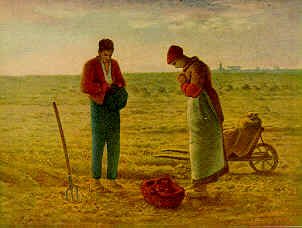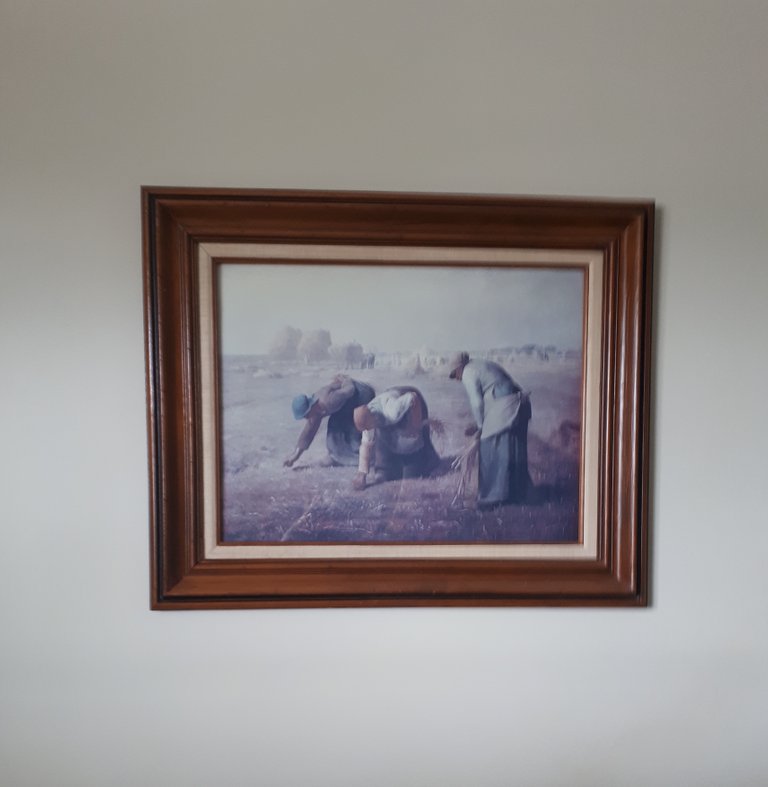
Usually, I like to break up my text, but the following poem is intended to be only two paragraphs.
First, I have a special story of synchronicity involving the picture/painting by Jean- Francois Millet. Years ago I had been inspired by the picture and subsequently wrote the poem, but it was not enough and I continued to think about it. Something. What was it?
Anyways, what happened was strange. I've always enjoyed garage sales as a hobby and one day in the summer more than a few years back, I came across The Angelus and The Gleaners shown here:

This is what I can see directly in front of my desk at present and I remember how it came to be here. The daughter of the gentleman who had owned it was moving to a seniors home and couldn't take much with him. I was happy to inform his daughter that the pictures would be in good hands.
I hope, too, that they do more than just hang on walls, unappreciated for their actual significance. I hope they send a message of faithful work and service. Of frugal living. Of the earth and prayer and growing what manifests out of the ground.
The Subject Matter in The Painting
It's not known precisely when it swept through Europe, but sometime in the early fourteenth century, the recitation of the Angelus became widespread.
The Angelus Prayer
V. The Angel of the Lord declared unto Mary.
R. And she conceived of the Holy Spirit.
Hail Mary, full of grace,
The Lord is with Thee;
Blessed art thou among women,
And blessed is the fruit of thy womb, Jesus.
Holy Mary, Mother of God,
Pray for us sinners,
Now and at the hour of our death. Amen
V. Behold the handmaid of the Lord.
R. Be it done to me according to thy word.
Hail Mary. . .
V. And the Word was made flesh.
R. And dwelt among us.
Hail Mary. . .
V. Pray for us, O holy Mother of God.
R. That we may be made worthy of the promises of Christ.
Let us pray: Pour forth, we beseech Thee, O Lord, Thy grace into our hearts, that we to whom the Incarnation of Christ Thy Son was made known by the message of an angel, may by His Passion and Cross be brought to the glory of His Resurrection. Through the same Christ Our Lord. Amen
First it was recited at sunset, but later it was also spoken in the morning and midday. The painting by Millet, it too, has an uncertain history buried in time, and underneath its paint.
Dali had been obsessed by it, believing a coffin existed underneath the ground between the two peasants. The painting was later x-rayed and indeed, the shape of a coffin was found to exist underneath its surface layers. It's not known whether this is just a coincidence or if Millet had remodelled it.
*What I Think
The significance of a prayer is deep and personal. Today, it begs the question: When? When can we pray in our highly digitized (is that the word?) lives? If we are Jewish, who will light the Shabbat candles if no one is home? Will an auto-Alexa type thing suffice? Are we currently evolved enough to really pray? Or are they mere words that even an Auto-Alexa could also spout. Are we more concerned with our drive-thru coffee habits than our neighbours?
The concept of being truly present is something I have always yearned for. To really listen to the person speaking. To really be. To think. To really question and not take things at surface value... I better move on now, but you can see how important these ideas are to me.
And here's my take on the matter of the painting...
Regarding The Angelus
It may have been 1312 or some other now obscure date in the early fourteenth century of Europe, but as any day, the sun would swing round, arc high in a summer's sky and begin its journey downward until the sky along the horizon became mixed in purple and pink hues, finally darkening into some kind of indefinable blue late into the evening while upon the rich warm earth, the peasants stopped amid their field of potatoes perhaps, or beets, or some other worthy crop growing under the blanket of a hot afternoon; and even still into the night, and though the labourers may have been a great distance away from the tolling of bells in near and distant villages, where others also stopped their daily vigour, they too in unison with those labouring in the dirt; those lacking craft of skill or social merit, but all of these with and without, together upon a great religious pillar of faith, all of those souls together in grievous thought, though already forgiven, still seeking indulgences, the remission of sins despite any crucifixion, standing or kneeling, scattered under heaven, the pious, bowing their heads in devotion to the memory of the incarnation of Christ, calling aloud once a Hail Mary, acknowledging all that is before God, twice a Hail Mary, for sins yesterday, today and tomorrow and thrice: Hail Mary with all the other prayers and the most penitent heart: Lord have mercy, Christ have mercy; while another minute passed away from the beginning, closer to an uncertain end; to a faraway place without any heavy garment of flesh to encumber the soul, and this is the dream of the rich nobility who have stopped this moment to pray the Angelus and this is the dream of the poor in the field as the sun sinks still deeper and the sky sheds its golden glow for another evening born again and another day dead, the Angelus will sing like a soft wind over a hot field, like a tender veil so strong, protecting the fallen, filling them, raising them up in a new day, long after many more sunsets and many more recitations, the Angelus...for mercy, in Christ, for Mercy, Hail Mary...pray for us sinners, now and at the hour of our death.
So it was in 1312 or some other obscure time in the early fourteenth century, each day at sunset praying again until the ritual became an element of the morning too, and also at midday, one upon the last, again and again, in measured grace, ticks upon an eternal clock, under a wandering old European sky where a great civilization grew up comported to ancient ways; then modern ones, thriving, heaping upon baptisms and blessings in elegant churches filled with the mystery of the spirit; devoid of the soil from the earth except what might enter upon foot, but even then, there were those, in filthy clothes among the flies, sweating above it all who would stop to look at a potato, just raised from the dirt and notice its purely miraculous growth which took place quietly, hidden underneath the ground in perpetual darkness, while those in the cathedrals sang melodies high into the air reaching towards the windows, their stained glass glazed in light; the same light that shines on the peasants in the fields and the freshly dug potatoes, and they all prayed the Angelus; when they prayed the Angelus, some with generosity and some in a quick turn, not quite ready to give fully anything much more than the words themselves, but then some did, and maybe those that did, those that fully accommodated the moment, whether in the field or in the chapel had a pleasant affection imparted to them, like a gentle hand swept upon a tired brow; this caring fondness reaching over the soul, understanding the human condition, what it means to be alive, speaking great eternal truths, whispering under the sun, the hope of the passion of Christ, the graceful prayer of the Angelus, rising up like scented blossoms forever in a stillness of unknowable peace, every hunger satisfied, every thirst quenched, every pain extinguished; this is the moment, as obscure as any time, like a summer past, in 1312. This is the moment.
By Haileevalley
Congratulations @haileevalley! You have completed the following achievement on the Steem blockchain and have been rewarded with new badge(s) :
You can view your badges on your Steem Board and compare to others on the Steem Ranking
If you no longer want to receive notifications, reply to this comment with the word
STOPTo support your work, I also upvoted your post!
Vote for @Steemitboard as a witness to get one more award and increased upvotes!